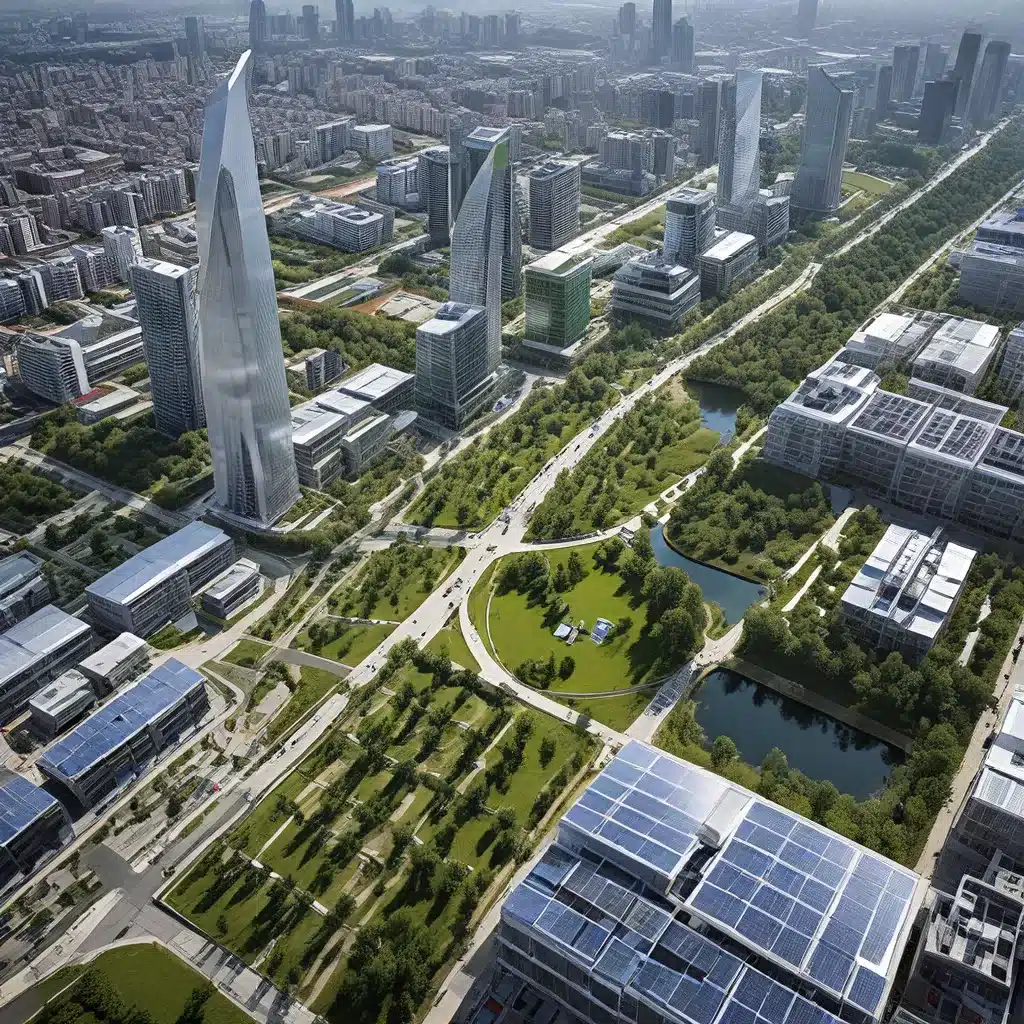
As an avid urban explorer and sustainability enthusiast, I’ve always been captivated by the idea of smart cities – places where technology seamlessly blends with the built environment to create a more efficient, livable, and sustainable future. And now, with the rapid advancements in renewable energy and artificial intelligence (AI), I can’t help but wonder – what does the urban landscape of tomorrow really look like?
Let me take you on a journey through this incredible transformation, where smart cities and renewable energy are redefining the very fabric of our cities. Prepare to be amazed, inspired, and maybe even a little perplexed, as we dive into the cutting-edge solutions that are shaping the urban landscapes of the future.
Powering Smart Cities with Renewable Energy
Imagine a city where energy, water, and waste are managed with utmost efficiency, where pollution is minimal, and traffic congestion is a thing of the past. This vision of a smart city powered by AI is no longer a distant dream, but a rapidly evolving reality. And at the heart of this transformation lies the integration of renewable energy solutions.
According to the European Commission, AI is revolutionizing urban landscapes by empowering smart city solutions, leading to enhanced energy, water, and waste management efficiency, as well as reduced pollution, noise, and traffic congestion. By 2025, AI is projected to power over 30% of smart city applications, with urban mobility solutions significantly contributing to urban resilience, sustainability, social welfare, and overall vitality.
But the journey to creating these sustainable, AI-driven smart cities is not without its challenges. Local authorities often encounter significant hurdles, including the availability and reliability of technology, data dependence on third-party private entities, and skill shortages. Deloitte highlights the importance of collaboration between private and public organizations in navigating these obstacles and seizing the opportunities presented by AI and renewable energy in smart cities.
Transforming Urban Mobility with AI and Renewable Energy
One of the most exciting frontiers in smart city development is the transformation of urban mobility. AI-driven solutions are revolutionizing the way we move around our cities, offering a glimpse into a future where transportation is not only efficient but also sustainable.
Imagine a city where self-service electric cars, short-distance carpooling, smart parking management, and Mobility as a Service (MaaS) are the norm. These AI-powered mobility solutions not only reduce traffic and lower the environmental impact but also increase awareness of sustainable practices among citizens. In fact, a study found that 38% of people would be willing to give up their cars for a similar AI-based service, presenting vast business opportunities in the mobility sector.
Companies like Firewinder are at the forefront of this transformation, developing innovative AI-powered mobility solutions that seamlessly integrate with renewable energy sources. By harnessing the power of AI and renewable energy, these solutions are creating a more sustainable, efficient, and user-friendly urban transportation system.
Optimizing Energy, Water, and Waste Management with AI
But the integration of AI and renewable energy in smart cities extends far beyond just transportation. These cutting-edge technologies are revolutionizing the way we manage vital resources, such as energy, water, and waste.
In the realm of energy optimization, AI can address challenges like leakage detection, predictive maintenance, and water quality improvement, contributing to water sustainability in cities with significant leakage issues. Similarly, smart urban lighting powered by AI can enhance city infrastructure and services through remote monitoring, control, and data analysis.
And when it comes to waste management, AI-driven solutions can improve the efficiency of waste collection, processing, and recycling, all while reducing the environmental impact. The urban farming sector is also benefiting from AI-powered automation solutions for crop monitoring and care in vertical farming setups, further enhancing the sustainability of our cities.
Enhancing Safety, Security, and Citizen Engagement with AI
But the integration of AI and renewable energy in smart cities goes beyond just resource optimization. It’s also transforming the way we approach safety, security, and citizen engagement, paving the way for a more resilient and inclusive urban future.
AI-driven solutions enable smart policing, personalized healthcare, noise and nuisance management, and better cyber security, as well as disaster prevention and management. These innovative applications leverage real-time data analysis and predictive modeling to bolster emergency response capabilities, creating safer urban spaces for all.
Moreover, AI empowers resilient and engaged citizens in smart cities through initiatives like Citizen Energy Communities (CEC). These initiatives involve citizens in sustainable and reliable energy systems, amplifying local enthusiasm and resources toward energy sustainability efforts. By supporting real-time data-driven decision-making processes, AI is fostering a more engaged, sustainable, and secure urban future.
Navigating the Challenges and Seizing the Opportunities
As exciting as the prospects of smart cities and renewable energy may be, the road to implementation is not without its challenges. Local authorities and private organizations must navigate a complex landscape of technological, social, and regulatory hurdles to bring these visions to life.
Deloitte emphasizes the importance of collaboration between private and public organizations in overcoming these obstacles and seizing the opportunities presented by AI and renewable energy. By partnering with experienced AI consulting companies like Firewinder, cities can harness the power of these transformative technologies to create a more sustainable, connected, and human-centric future.
The integration of AI and renewable energy in smart cities is not just about efficiency and optimization – it’s about redefining the very fabric of our urban landscapes. It’s about creating spaces that are not only technologically advanced but also truly human-centric, where the well-being of our citizens and the health of our planet go hand in hand.
So, as we move forward, let’s embrace the possibilities, tackle the challenges, and work together to shape the urban landscapes of tomorrow. The future is ours to create, and it’s going to be renewable, smart, and unforgettably amazing.

